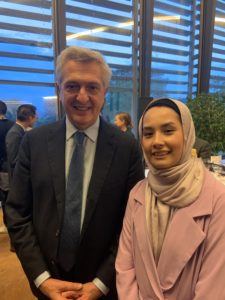On October 13, Madiha Ali, a dynamic refugee advocate, and a member of the steering committee of the Refugee Self-Reliance Initiative, delivered the NGO Statement for the general debate for the Executive Committee of the High Commissioner’s Programme (ExCom) in Geneva, Switzerland. The full written statement can be accessed here. The statement highlighted that at this time of unprecedented global displacement—with a staggering 100 million people who’ve been forced to flee their homes—refugee self-reliance models need to be the norm, rather than the exception when planning assistance and response to ongoing crises. It was one of only two civil society statements that were presented at ExCom, which is an annual meeting of the UNHCR attended by many member state delegations and civil society representatives. The RSRI is a global multi-stakeholder collaboration co-founded and hosted by RefugePoint that aims to reach five million refugees in five years with programming that puts them on a path to self-reliance and reshapes the humanitarian response paradigm away from emergency aid.

Global forced displacement is at its highest recorded, with over 30 million people who have fled their countries (and more than double that number displaced within their own country). Coupled with the extended length of displacement — often 20 or more years — and the lack of sustainable solutions for refugees — less than 3% return home annually — this growing global challenge is leaving increasing numbers of people living in limbo. Most refugees say they want to “stand on their own feet” — to take care of their own needs and those of their family. They request support to build independent lives in their new homes, whether their stay is temporary or permanent.
Self-reliance is recognized as a key solution to the global displacement crisis, with several recent high-level inter-governmental initiatives emphasizing the need to enhance self-reliance opportunities for refugees, including the 2030 Agenda for Sustainable Development and the 2018 Global Compact on Refugees. Despite this, the prevailing humanitarian response has focused on emergency aid. According to the former UN Secretary-General, Ban Ki-moon, this leaves millions of refugees “trapped in dependency on short-term aid that keeps them alive but falls short of ensuring their safety, dignity, and ability to thrive and be self-reliant over the long term.”
Self-reliance involves helping refugees to meet their own essential needs so that they can live in safety and dignity, without the need to rely on humanitarian aid. The statement will call out examples of self-reliance initiatives already being rolled out and will make policy recommendations targeting key stakeholders, including the UNHCR, member states, and humanitarian actors.
Now more than ever, we need long-term solutions for refugees. The statement that Madiha Ali delivered on October 13 highlighted the importance of self-reliance as one of these long-term solutions.
About the Refugee Self-Reliance Initiative (RSRI):
The Refugee Self-Reliance Initiative (RSRI) is a multi-stakeholder collaboration, co-founded with the Women’s Refugee Commission and hosted by RefugePoint, that promotes opportunities for refugees around the world to become self-reliant and achieve a better quality of life. Through action, learning, and collaboration, The RSRI aims to transform refugee assistance, transitioning more quickly from emergency relief to sustainable development – that is, helping refugees who desire self-reliance to achieve it. As a milestone toward this paradigm change, the RSRI aims to collectively reach five million refugees in five years with programming that puts them on a path to self-reliance. In the process, the RSRI aims to identify the most effective models, measurements, and policy environments to aid the global expansion of self-reliance opportunities.